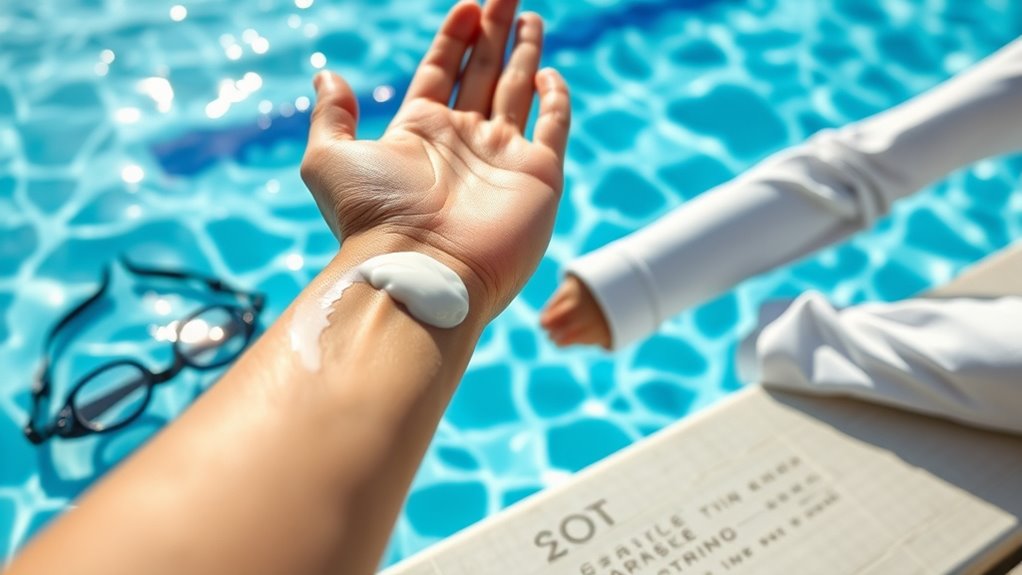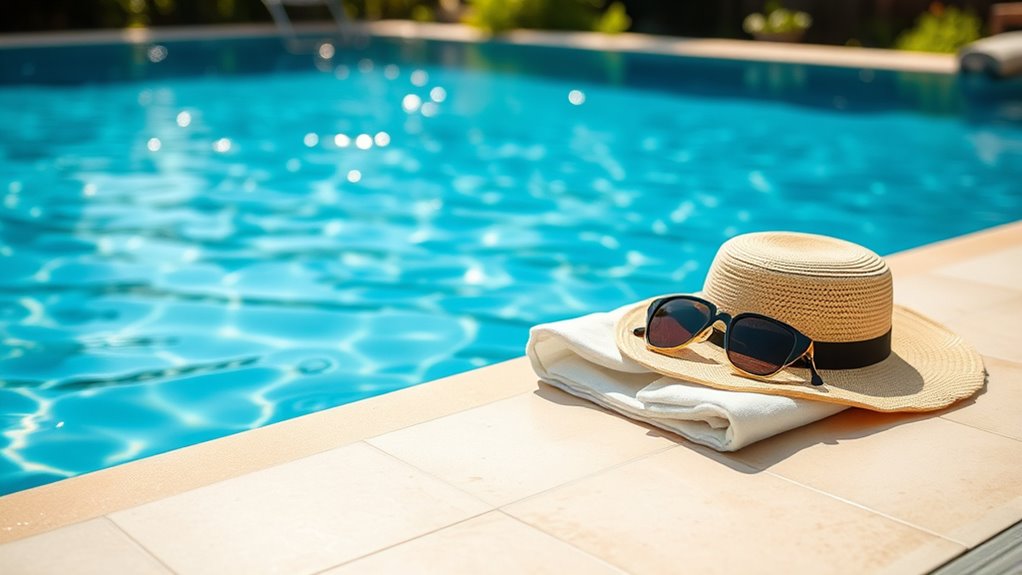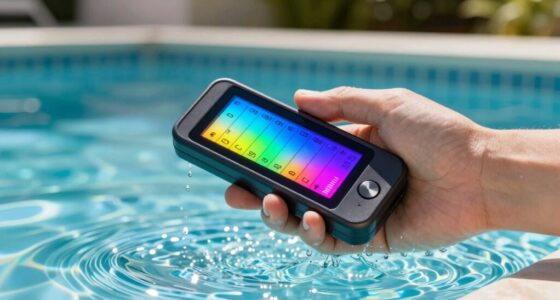To prevent long-term chlorine skin damage, you should rinse off immediately after swimming with lukewarm water and a gentle, moisturizing soap, then pat your skin dry and apply a rich, fragrance-free moisturizer. Use water-resistant barrier creams or petroleum jelly before swimming, limit your exposure time, and take regular breaks. Keep your skin hydrated from within, choose sensitive-skin products, and consider waterproof gear. Following these steps can help protect your skin—discover more effective strategies ahead.
Key Takeaways
- Apply a water-resistant, emollient moisturizer before swimming to create a protective barrier against chlorine.
- Limit swimming duration and take frequent breaks to reduce prolonged skin exposure.
- Rinse off pool water immediately with lukewarm, gentle soap and pat dry to remove chlorine residues.
- Use waterproof gear like swim gloves and silicone barriers to shield sensitive skin areas.
- Incorporate regular skincare with ceramides or hyaluronic acid to strengthen skin’s moisture barrier over time.

Chlorine is commonly used to disinfect pools, but it can also cause skin dryness, irritation, and damage if you’re not careful. When you spend time in pool water, the chlorine interacts with your skin, stripping away natural oils that maintain your skin barrier. This disruption makes your skin more vulnerable to irritation, redness, and even long-term damage if you don’t take steps to protect yourself. Understanding how chlorine affects your skin and adopting effective measures can help you enjoy swimming without sacrificing your skin’s health.
Chlorine can cause skin dryness and damage without proper protection.
One of the most important things you can do is shower immediately after swimming. Rinsing off pool water removes residual chlorine from your skin, reducing its contact duration and minimizing the potential for damage. Use lukewarm water and a gentle, moisturizing soap to cleanse thoroughly, paying particular attention to areas prone to dryness. After showering, pat your skin dry instead of rubbing, which can further irritate your skin barrier. Applying a rich, fragrance-free moisturizer right after drying helps restore lost oils and reinforces your skin’s natural defenses against chlorine’s drying effects.
Another key strategy is to create a protective barrier before entering the pool. Applying a water-resistant, emollient-based moisturizer or barrier cream can act as a shield, reducing chlorine’s penetration into your skin. Many swimmers find that applying petroleum jelly or specially formulated barrier creams before pool time can significantly lessen dryness and irritation. This barrier not only helps preserve your skin’s natural oils but also minimizes the harsh effects of chlorinated water on your skin barrier, promoting healthier skin over time.
Wearing protective gear can also make a difference. Consider using waterproof swim gloves or applying a silicone-based barrier on exposed skin areas. These physical barriers limit direct contact with pool water, which is especially helpful if you have sensitive skin or a history of dermatitis. Additionally, limiting your time in chlorinated water and taking regular breaks can help your skin recover and reduce cumulative damage.
Consistently maintaining good skin hydration is essential. Drinking plenty of water keeps your skin hydrated from within, supporting your skin barrier’s resilience. Incorporate nourishing skincare products containing ceramides or hyaluronic acid into your routine, as these ingredients help strengthen and retain moisture in your skin. Additionally, choosing vetted products designed specifically for sensitive skin can further prevent long-term damage caused by chlorine. Ultimately, if you notice persistent dryness or irritation, consult a dermatologist for personalized advice and treatment options. By taking these proactive steps, you can enjoy swimming and maintain a healthy skin barrier, preventing long-term chlorine skin damage.

BAZA Protect Cream – Skin Moisture Barrier
Coloplast moisture barrier cream's active ingredients, 12% zinc oxide and 1% dimethicone, restore skin health
As an affiliate, we earn on qualifying purchases.
As an affiliate, we earn on qualifying purchases.
Frequently Asked Questions
Can Chlorine Exposure Cause Allergic Skin Reactions?
Chlorine exposure can cause allergic skin reactions, especially if your skin absorbs chlorine easily or your skin barrier is compromised. When chlorine absorbs into your skin, it can trigger irritation or allergic responses like redness, itching, or rashes. To reduce this risk, protect your skin by applying barrier creams or moisturizing thoroughly before swimming, and rinse off promptly after exposure to help maintain a healthy skin barrier and minimize allergic reactions.
Are There Natural Remedies for Chlorine-Induced Skin Irritation?
If you’re looking for natural remedies for chlorine-induced skin irritation, try using skin soothing options like aloe vera or coconut oil. These natural remedies can help calm irritated skin and reduce redness. Remember to rinse your skin thoroughly after swimming and moisturize regularly to prevent further irritation. Applying these natural remedies consistently can soothe your skin and keep irritation at bay, making your post-swim recovery more comfortable.
How Does Chlorine Affect Different Skin Types Over Time?
Chlorine affects different skin types over time by increasing chlorine absorption, which can weaken your skin barrier and cause irritation. For sensitive or dry skin, this disruption worsens dryness and redness, while oily or acne-prone skin may experience breakouts due to excess sebum. To protect your skin, you need to minimize chlorine absorption and strengthen your skin barrier, especially if you have delicate or compromised skin.
What Are the Signs of Long-Term Chlorine Skin Damage?
You might notice signs of long-term chlorine skin damage such as increased dryness, redness, and irritation. Chlorine absorption can weaken your skin barrier, leading to itchiness and sensitivity. Over time, your skin may become more prone to cracking and infections. Pay attention to these symptoms, as they indicate your skin’s protective layer is compromised, and taking steps to restore your skin barrier can help prevent further damage.
Does Showering Immediately After Swimming Prevent Skin Damage?
Showering immediately after swimming is a smart move for post swim skincare, as it helps rinse away chlorine and reduce skin irritation. Timely showering minimizes chlorine’s contact with your skin, lowering the risk of long-term damage. Ideally, you should shower within a few minutes of swimming to lock in skin health. Proper shower timing, combined with moisturizing afterward, keeps your skin protected and healthy over time.

Critic-Aid® Clear Moisture Barrier Ointment – 6 oz (170 g) Tube
COL7567
As an affiliate, we earn on qualifying purchases.
As an affiliate, we earn on qualifying purchases.
Conclusion
By following these tips, you’ll shield your skin from chlorine’s relentless attack, turning your daily swim into a battle you’re winning effortlessly. Imagine never waking up with dry, cracked skin or fearing the dreaded chlorine rash again—your skin will thank you for this armor! So plunge in confidently, knowing you’ve got the ultimate weapon against long-term damage. With these simple tricks, you’ll be a chlorine-proof superhero, conquering pools without a scratch!

3mm Neoprene Gloves Diving Gloves Wetsuit Gloves, Anti Slip Fishing Gloves Surfing Glove with Adjustable Wrist Strap, Water Proof Gloves Pool Glove Swim Gloves Ice Fishing Gloves (Black, Large)
Hands Protection – These neoprene gloves are strong but flexible, provide perfect protection for your hands in multiple…
As an affiliate, we earn on qualifying purchases.
As an affiliate, we earn on qualifying purchases.

Vanicream Daily Facial Moisturizer With Ceramides and Hyaluronic Acid – Formulated Without Common Irritants for Those with Sensitive Skin, 3 fl oz (Pack of 1)
Vanicream is the #1 Dermatologist recommended Brand for Sensitive Skin: Source IQVIA ProVoice Survey, 12 months ending July…
As an affiliate, we earn on qualifying purchases.
As an affiliate, we earn on qualifying purchases.










